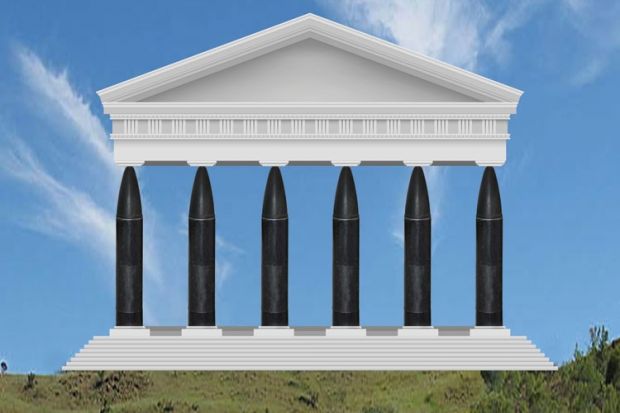On 18 November, Brandeis University, a liberal arts college in Massachusetts that describes itself as the only non-sectarian Jewish-sponsored institution in the US, suspended its partnership with Al-Quds University, a Palestinian institution with campuses in East Jerusalem and on the West Bank.
Brandeis said in a statement: “The Nov. 5 demonstration on the Al-Quds campus involved demonstrators wearing black military gear, armed with fake automatic weapons, and who marched while waving flags and raising the traditional Nazi salute. The demonstration took place in the main square of the Al-Quds campus, which was surrounded by banners depicting images of ‘martyred’ suicide bombers.”
Photographs of the rally were circulated online and prompted widespread criticism. In response, Brandeis’ president, Frederick Lawrence, called on his Al-Quds counterpart, Sari Nusseibeh, to unequivocally condemn the demonstration. Nusseibeh issued a letter to students, saying that the coverage had misrepresented the university “as promoting inhumane, anti-Semitic, fascist, and Nazi ideologies”, but Brandeis described his response as “unacceptable and inflammatory”.
I spent a semester teaching English literature at Al-Quds earlier in 2013. The scale and significance of the rally has been exaggerated. Around 40 students participated out of a student body of 13,000. One undergraduate wrote to me afterwards: “I’m sure 80 per cent of our students have no idea it happened, while tens of pro-peace conventions and exchange projects go unnoticed outside campus.”
This is not to discount that the rally raises questions for Al‑Quds about how to manage dissent and extremism (an issue faced by universities worldwide). Yet a report by Brandeis’ International Center for Ethics, Justice and Public Life, released on 9 December, concludes that Al‑Quds’ staff responded “promptly and appropriately” in investigating the event and calls on Brandeis to resume and “redouble” the partnership.
The challenges faced by Al-Quds are exceptional. Its two main campuses are 7km apart. The sites, one in East Jerusalem, are separated by the West Bank barrier and it can take over an hour to travel between them. The university can, as a consequence, register neither as an Israeli institution nor as a “foreign” one – the status given to other Palestinian universities by Israel’s Council for Higher Education. This has implications for its funding, but also for students. For example, if an Al-Quds graduate in medicine lives in Jerusalem, his or her degree is not recognised there.
The main campus is in Area B of the West Bank, which is under joint Israeli-Palestinian control. While I was there, classes were disrupted several times by tear gas fired by Israeli Defence Force soldiers on to campus. On 17 November, my colleagues at Al-Quds reported that 40 people, including a large number of students, had been shot with rubber-coated bullets during an IDF raid on campus.
Students at Al-Quds face practical obstacles on a daily basis, on campus and in travelling to it. Yet the vast majority of them respond with courage, dignity and humour. I hope the Brandeis partnership is restored. There is much that undergraduates in the US and the UK might learn from their counterparts at Al-Quds.
Register to continue
Why register?
- Registration is free and only takes a moment
- Once registered, you can read 3 articles a month
- Sign up for our newsletter
Subscribe
Or subscribe for unlimited access to:
- Unlimited access to news, views, insights & reviews
- Digital editions
- Digital access to THE’s university and college rankings analysis
Already registered or a current subscriber? Login

